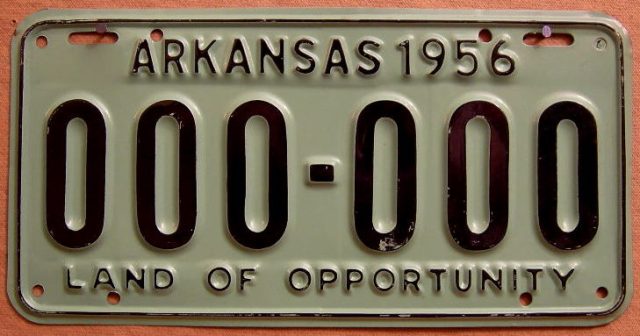
As Ars has reported before, these scanners have been increasingly deployed in cities and towns across the US. LPRs can read, analyze, and store 60 plates per second. Typically, the LPR checks an unknown plate against a "hot list" of wanted or stolen vehicles, but the tricky part is that LPRs aren’t just looking for suspected bad guys. They almost always record and retain the time, date, and precise location of every license plate scanned, often for years and sometimes forever.
In this case, the two firms in question—Digital Recognition Network (DRN) and Vigilant Systems—generate, maintain, and share access to the license plate reader database with law enforcement.
The new Arkansas state law took effect in 2014, and it bans the private collection of license plate reader data while still allowing the cops to use the devices, usually mounted on patrol cars. The two companies say that their First Amendment rights are being violated, as they are allowed to photograph—even under an automated, high-speed process that is then shared with law enforcement—any and all license plates, anywhere.
As the companies state in their civil complaint:
“The First Amendment lawsuit is focused on ensuring that our free speech rights are protected in the state of Arkansas,” Todd Hodnett, DRN’s founder, said. “We look forward to having our case heard and will not comment further at this time.”The State does not have a substantial interest in preventing persons from viewing or photographing license plates—or from disseminating the information collected when doing so—because license plates contain no private information whatsoever. Moreover the photographic recording of government-mandated public license plates does not infringe any “private” interest that concededly is not infringed when the photographers view the plate. Thus, the State cannot carry its heavy burden to demonstrate that it has a substantial interest that is served by the Act.
For his part, Arkansas’ attorney general was equally forceful.
“Our law is crafted carefully to protect both the privacy concerns of Arkansans and legitimate law enforcement purposes,” Aaron Sadler, the spokesman for the Arkansas attorney general, told Ars. “We are prepared to defend the law.”
Previously, the two companies had filed a similar suit in Utah, which was dropped after the Beehive State amended its law.
Repo men
DRN, by its own admission, doesn’t do substantial business in Arkansas. Court filings state that the company sold “a total of three ALPR (automatic license plate reader) camera kits to three companies operating in Arkansas,” for $15,825 each. But since the new law took effect, such sales have stopped, as has any Arkansas-based data-sharing.
According a court filing by the company’s founder, DRN sells LPR kits to its “camera affiliates”—often repossession companies.“The camera affiliates place DRN’s ALPR systems on tow trucks or other vehicles,” Todd Hodnett stated. “DRN’s ALPR systems then take photographs that include nearby vehicles’ license plates. When DRN’s camera affiliates collect license-plate data using ALPR systems, DRN then disseminates the resulting license-plate data to its clients and partners, which use the data for purposes such as identifying cars that should be repossessed and locating cars that have been stolen or fraudulently reported as stolen. For example, DRN earns substantial revenue by selling license-plate data to automobile lenders and insurance companies.
“DRN also has a partnership with Plaintiff Vigilant Solutions National Vehicle Location Service, through which DRN’s ALPR data is made available to law enforcement agencies—usually at no cost to the agencies. Specifically, DRN provides captured license-plate data to Vigilant, which then share the data with law enforcement agencies for purposes that range from utilizing near real-time alerts for locating missing persons and stolen vehicles to the use of historical license-plate data to solve crimes.”
"Sometimes resulted in investigative leads"
DRN and Vigilant claim that even though they only sold three LPR units in the entire state, its data was useful to cops.
“Prior to the effective date of the Act, when law enforcement agencies in Arkansas made queries against Vigilant’s data, the data sometimes resulted in investigative leads,” asserted Vigilant CEO Shawn Smith in a court filing. “Vigilant’s data thus assisted law enforcement in efforts such as locating fugitives, locating abducted children, and investigating and solving a variety of major crimes. In many (if not all) cases, Vigilant provided this data free of charge.”
However, on its own website, Vigilant says that it currently maintains a database of “over 1.8 billion detections and grows at a rate of almost 70 million per month. This data is available via an annual subscription and greatly enhances an agency’s investigative reach.”
Josh Zecher, a spokesman for Vigilant and DRN, declined to provide “specifics on pricing.”
“Vigilant only sells [to and] only works with law enforcement,” he wrote in an e-mail. “There is a basic subscription model that is free. This offers a limited amount of searches, analytics, etc. But, then there are other subscription models based on number of searches and additional analytics that incur additional costs.”
Zecher has repeatedly declined Ars’ offer to meet with company executives in person to learn more about the company and its product.
reader comments
115